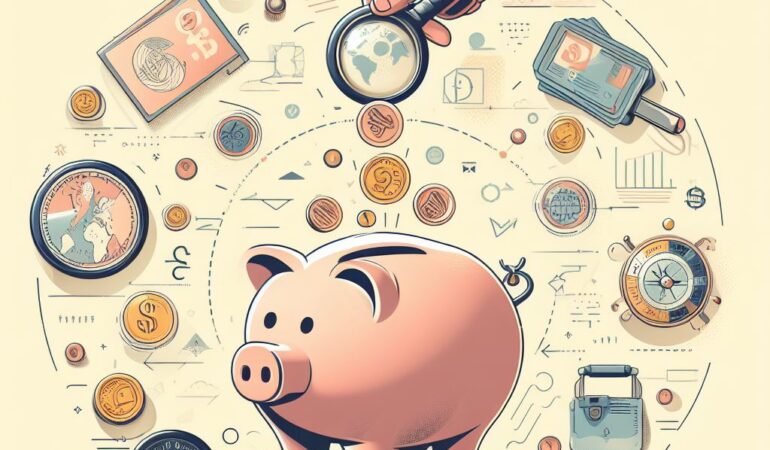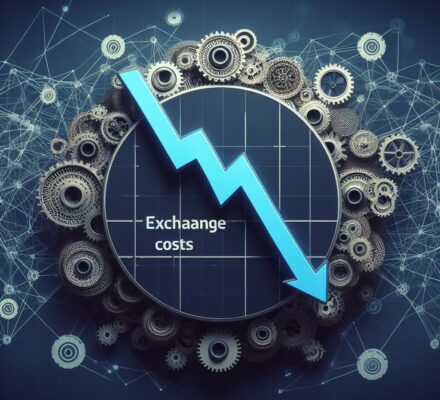Are you tired of paying exorbitant fees whenever you exchange currency? Look no further!
In this article, we will provide you with 9 tips to minimize those pesky exchange expenses easily. From researching exchange rates to using multi-currency cards, we’ve got you covered.
Say goodbye to costly airport exchanges and hello to more savings in your pocket. Don’t miss out on these invaluable tips that will make your next currency exchange a breeze.
Key Takeaways
- Research exchange rates before making a transaction
- Use a multi-currency card to eliminate currency conversion fees
- Avoid airport currency exchanges for better rates
- Explore safer local options for currency exchanges
Research Exchange Rates
Are you wondering how to minimize exchange expenses easily? Start by researching exchange rates. One of the most important factors to consider when exchanging currency is the current exchange rate. Exchange rates can fluctuate daily, and even small changes can have a significant impact on the amount of money you receive. By researching exchange rates before making a transaction, you can ensure that you’re getting the best possible rate.
There are many resources available online that provide up-to-date exchange rates for different currencies. Take the time to compare rates from different sources to find the most favorable one. Additionally, consider setting up rate alerts or notifications so you can be informed when rates are in your favor.
Researching exchange rates not only helps you get the best rate, but it also allows you to plan your exchanges strategically. If you know that a particular currency is expected to strengthen in the near future, you may choose to wait before making your exchange. On the other hand, if you anticipate a currency to weaken, it may be wise to exchange your money sooner rather than later.
By researching exchange rates, you can make more informed decisions about when and how to exchange your money, ultimately minimizing your exchange expenses.
Now, let’s explore another useful tip: using a multi-currency card.
Use a Multi-Currency Card
To minimize your exchange expenses easily, consider using a multi-currency card. This convenient financial tool allows you to make transactions in multiple currencies without the need for physical cash or frequent currency conversions. Here are some reasons why using a multi-currency card can be beneficial:
- Eliminate currency conversion fees: With a multi-currency card, you can load different currencies onto the card and use it directly for purchases or withdrawals in those currencies, avoiding costly currency conversion fees.
- Lock-in exchange rates: Some multi-currency cards allow you to lock-in exchange rates at the time of loading the card. This helps you avoid fluctuations in exchange rates and ensures you know exactly how much you’re spending in your home currency.
- Access to multiple currencies: Whether you’re traveling to multiple countries or frequently conducting business internationally, a multi-currency card allows you to have easy access to different currencies, making transactions more convenient and cost-effective.
- Online management and tracking: Many multi-currency card providers offer online platforms or mobile apps that allow you to manage and track your transactions, making it easier to keep an eye on your spending and budget effectively.
Using a multi-currency card can simplify your travel or international transactions, saving you money on exchange fees and providing greater convenience. Make sure to compare different card providers and their fees before choosing the one that best suits your needs.
Avoid Airport Currency Exchanges
When it comes to exchanging currency, it’s best to avoid the airport. Airport currency exchanges often have higher fees and less favorable exchange rates compared to local options.
Better Exchange Rates
By avoiding airport currency exchanges, you can secure better exchange rates for your money. Airport currency exchanges often have higher fees and less favorable rates compared to other options. Here are some reasons why avoiding airport currency exchanges is a smart move:
- Lower fees: Airport currency exchanges typically charge higher fees to cover their operating costs, which can eat into your exchange amount.
- Unfavorable rates: Due to the convenience factor, airport currency exchanges tend to offer less competitive rates compared to other providers.
- Limited options: Airport currency exchanges may not offer a wide range of currencies, limiting your choices and potentially resulting in lower exchange rates.
Safer Local Options?
If you want to avoid airport currency exchanges and find safer local options, consider exploring other alternatives outside the airport. Airport currency exchanges often charge higher fees and offer less favorable exchange rates compared to local options. By venturing outside the airport, you can potentially save money and have a more secure exchange experience. Here are some safer local options to consider:
| Option | Pros | Cons |
|---|---|---|
| Local banks | Lower fees, better rates | Longer wait times, limited locations |
| Currency exchange offices | Convenient locations, competitive rates | May have higher fees than banks |
| Online currency exchange platforms | Convenient and accessible, competitive rates | Requires internet access, potential security risks |
Compare Exchange Fees and Commissions
When it comes to minimizing exchange expenses, comparing exchange fees and commissions is crucial. By exploring different cost-effective exchange options, you can find the best rates and avoid unnecessary fees.
Implementing fee comparison strategies can help you identify the most economical options and reduce commission expenses.
Cost-Effective Exchange Options
You can easily minimize your exchange expenses by comparing exchange fees and commissions for cost-effective exchange options. By doing so, you can ensure that you’re getting the best value for your money.
Here are some tips to help you find cost-effective exchange options:
- Consider online platforms: Online platforms often have lower fees and commissions compared to traditional brick-and-mortar exchange services. They can offer competitive rates due to their lower operating costs.
- Look for fee-free options: Some exchanges may offer fee-free transactions, especially for larger amounts. Keep an eye out for such options to avoid unnecessary fees.
- However, be cautious of hidden fees: Even if an exchange claims to have no fees, they may have hidden charges in the form of unfavorable exchange rates or additional service fees. Always read the fine print before proceeding.
Fee Comparison Strategies
To compare exchange fees and commissions and find the most cost-effective option, consider using fee comparison strategies. These strategies can help you make informed decisions and save money on your currency exchanges.
One effective strategy is to research and compare the fees and commissions charged by different exchange providers. Look for transparent and competitive rates, as well as any additional charges that may apply.
Another strategy is to consider the exchange rate offered by each provider. Sometimes, a provider with lower fees may offer a less favorable exchange rate, resulting in higher overall costs. It’s important to consider both the fees and the exchange rate to determine the best option for your needs.
Reducing Commission Expenses
To minimize commission expenses, compare exchange fees and commissions charged by different providers. By doing so, you can ensure that you’re getting the best deal and saving money in the process.
Here are some tips to help you compare exchange fees and commissions effectively:
- Research multiple providers: Take the time to research and compare the fees and commissions charged by different exchange providers. Look for ones that offer competitive rates and low commission fees.
- Consider the exchange rate: While comparing fees and commissions, also consider the exchange rate offered by each provider. Sometimes a provider with slightly higher fees may offer a more favorable exchange rate, resulting in overall savings.
- Read customer reviews: Look for customer reviews and feedback to get insights into the reliability and quality of service provided by each exchange provider. This will help you make an informed decision and choose a reputable provider.
- Be mindful of hidden charges: Pay attention to any hidden charges or additional fees that may be associated with certain providers. These can significantly impact the overall cost of your exchange.
- Negotiate: Don’t be afraid to negotiate with providers to see if you can get a better deal or have some fees waived. Some providers may be willing to work with you to earn your business.
Consider Peer-To-Peer Currency Exchanges
When minimizing exchange expenses, it’s worth considering peer-to-peer currency exchanges. Peer-to-peer currency exchanges, also known as P2P exchanges, are platforms that connect individuals looking to exchange currencies directly with each other. This eliminates the need for traditional intermediaries like banks or currency exchange services, resulting in potentially lower fees and better exchange rates.
One of the main advantages of using P2P currency exchanges is the ability to negotiate rates directly with other users. Unlike traditional exchanges where rates are set by the service provider, P2P exchanges allow users to set their own rates, giving you the opportunity to find a more favorable rate. Additionally, P2P exchanges often have lower fees compared to traditional exchanges, as they don’t have the same overhead costs.
However, it’s important to exercise caution when using P2P exchanges. Make sure to research and choose a reputable platform that has a strong user base and positive reviews. Additionally, be mindful of potential risks such as scams or fraudulent users. It’s recommended to use escrow services provided by the P2P exchange platform to ensure a secure transaction.
Take Advantage of Local ATMs
Looking to further reduce your exchange expenses? Why not consider how you can take advantage of local ATMs? Here are some reasons why using local ATMs can be beneficial:
- Lower Fees: Local ATMs typically charge lower withdrawal fees compared to currency exchange centers or banks. By withdrawing cash from local ATMs, you can save on unnecessary fees and keep more money in your pocket.
- Competitive Exchange Rates: Local ATMs often offer competitive exchange rates, especially when compared to currency exchange centers at airports or tourist areas. This means that you can get more value for your money when withdrawing cash from local ATMs.
- Convenience: Local ATMs are usually easily accessible and can be found in various locations, including shopping centers, hotels, and tourist spots. This makes it convenient for you to withdraw cash whenever you need it, without having to go out of your way.
- Security: Using local ATMs can be safer than carrying large amounts of cash or using unfamiliar currency exchange centers. Withdrawing cash from an ATM allows you to have the local currency on hand, reducing the risk of theft or loss.
Avoid Dynamic Currency Conversion
To minimize your exchange expenses, always avoid dynamic currency conversion. Dynamic currency conversion is a service offered by some merchants and ATMs that allows you to choose to pay in your home currency rather than the local currency. While it may seem convenient, it often comes with high fees and unfavorable exchange rates.
When you choose dynamic currency conversion, the merchant or ATM will convert the purchase amount or withdrawal amount into your home currency at their own exchange rate. This rate is typically much higher than the market rate, meaning you end up paying more for the transaction.
Furthermore, dynamic currency conversion often includes additional fees, which can further increase your overall expenses. These fees can be as high as 10% of the transaction amount, making it a costly choice.
To avoid dynamic currency conversion, always opt to pay or withdraw cash in the local currency. This way, your bank or credit card company will handle the currency conversion at a more favorable rate. Be sure to notify your bank of your travel plans in advance to avoid any issues with your card being blocked.
By avoiding dynamic currency conversion, you can save money on unnecessary fees and unfavorable exchange rates.
Now let’s move on to the next tip: planning your currency needs in advance.
Plan Your Currency Needs in Advance
To further minimize your exchange expenses, it’s crucial to plan your currency needs in advance. By doing so, you can avoid unnecessary fees and potential losses due to unfavorable exchange rates. Here are some tips to help you plan your currency needs effectively:
- Research the local currency: Before traveling to a foreign country, research and familiarize yourself with the local currency. Understand its value compared to your home currency and any restrictions or regulations that may apply.
- Estimate your expenses: Make a detailed list of your anticipated expenses during your trip. This includes accommodation, transportation, meals, and any activities or attractions you plan to visit. By estimating your expenses, you can determine how much local currency you’ll need.
- Consider exchange options: Explore different options for exchanging currency, such as banks, currency exchange offices, or ATMs. Compare exchange rates and fees to find the most favorable option. Additionally, consider using a prepaid travel card, which allows you to load and spend money in the local currency.
- Monitor exchange rates: Keep an eye on exchange rates leading up to your trip. If you notice a favorable rate, consider exchanging some of your currency in advance. However, be mindful of any expiration dates or fees associated with pre-purchased currency.
- Keep emergency funds: It’s always a good idea to have some emergency funds in the local currency. This can help you in unexpected situations or if you encounter difficulties with accessing your money.
Keep Track of Exchange Rates With Apps or Websites
To effectively manage your currency exchange expenses, continue tracking exchange rates with the help of apps or websites. By keeping a close eye on the fluctuating exchange rates, you can make informed decisions on when to exchange your money, ensuring that you get the best value for your currency.
One of the easiest ways to track exchange rates is by using apps or websites specifically designed for this purpose. These platforms provide real-time updates on currency exchange rates, allowing you to stay up-to-date with the latest market trends. Some popular apps include XE Currency, OANDA Currency Converter, and Currency Converter Plus. These apps not only provide accurate exchange rate information but also offer additional features such as currency conversion calculators and historical data analysis.
Websites such as XE.com, Bloomberg.com, and OANDA.com also offer comprehensive exchange rate tracking tools. These websites provide valuable insights into currency markets, including charts, graphs, and historical data. By utilizing these resources, you can gain a better understanding of the currency market and make well-informed decisions regarding your exchange transactions.
Tracking exchange rates with the help of apps or websites enables you to identify favorable rates and take advantage of them. It also helps you avoid unfavorable rates, saving you money in the long run. By staying informed about exchange rates, you can minimize your exchange expenses and make the most out of your currency conversions.
Frequently Asked Questions
Are There Any Hidden Fees or Charges Associated With Using a Multi-Currency Card?
There might be hidden fees or charges when using a multi-currency card. It is important to read the terms and conditions carefully to understand any potential costs associated with the card.
How Can I Find the Best Exchange Rates for My Currency Exchange?
To find the best exchange rates for your currency exchange, research different banks and currency exchange services. Look for competitive rates and compare them to get the most value for your money.
Is It Better to Exchange Currency at My Home Country’s Airport or at My Destination Airport?
It is generally better to exchange currency at your destination airport rather than your home country’s airport. This is because the rates at destination airports tend to be more favorable, resulting in lower exchange expenses.
What Are the Potential Risks Involved in Using Peer-To-Peer Currency Exchanges?
When using peer-to-peer currency exchanges, potential risks include scams, fraud, and lack of regulation. It’s important to thoroughly research and vet the platform and users before engaging in any transactions.
How Can I Avoid Falling Victim to Scams or Fraud When Using Local ATMs in a Foreign Country?
To avoid falling victim to scams or fraud when using local ATMs in a foreign country, be cautious and follow these tips: use ATMs located in well-lit and busy areas, cover your PIN, and regularly monitor your bank statements for any suspicious activity.




